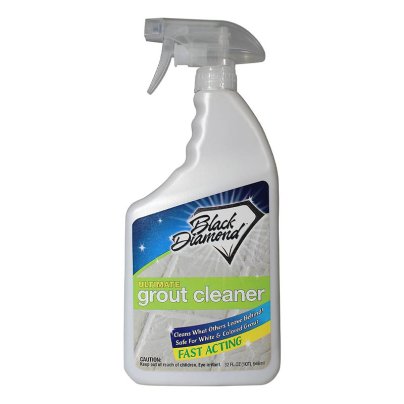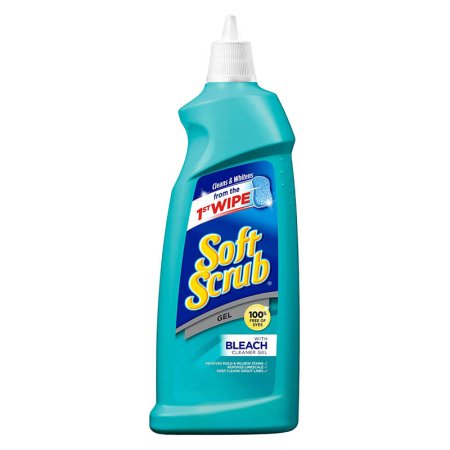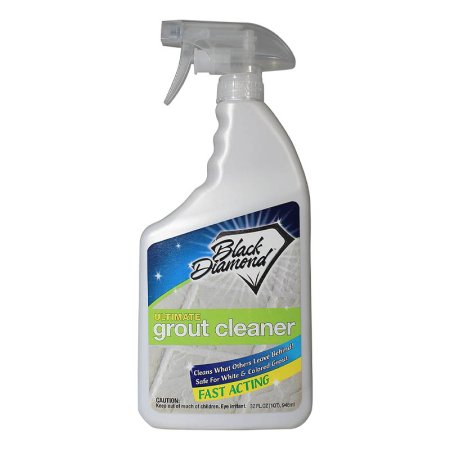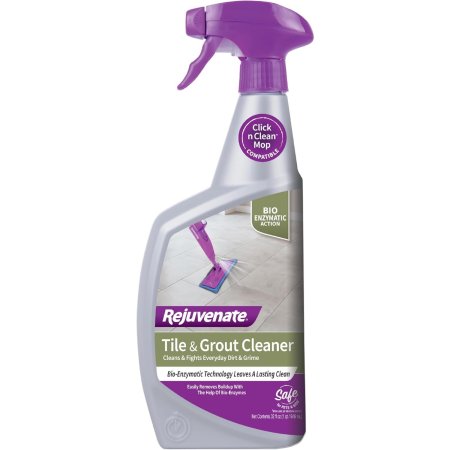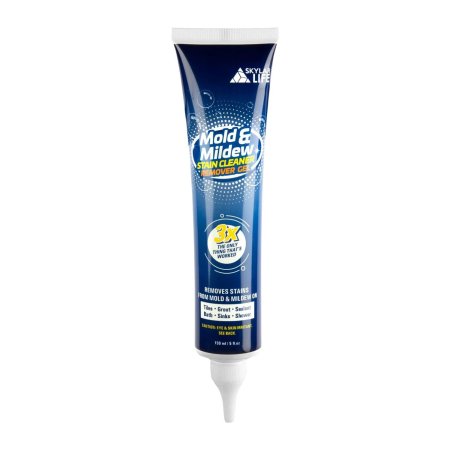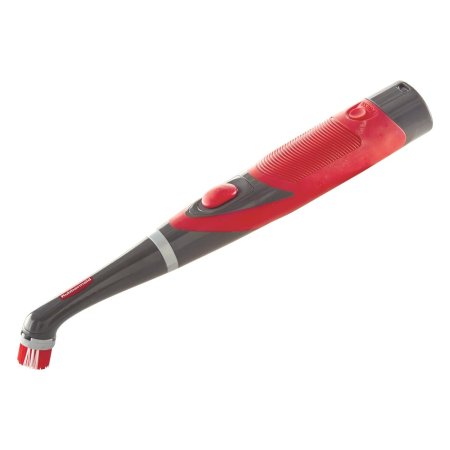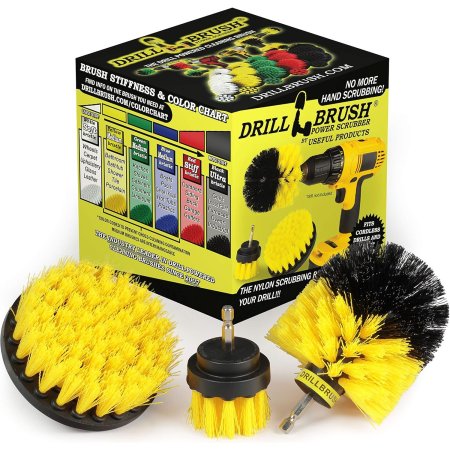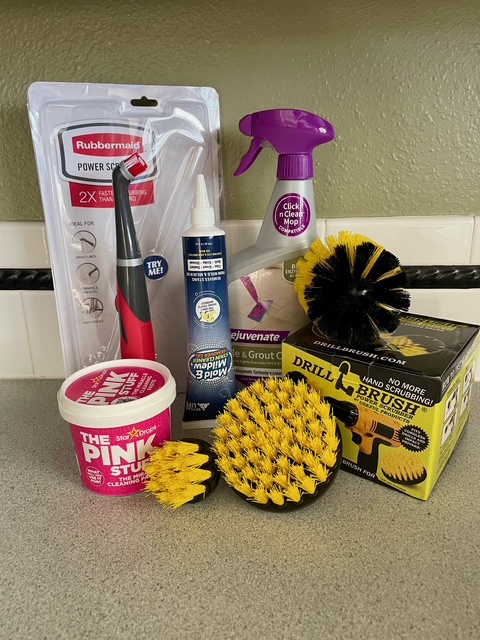
We may earn revenue from the products available on this page and participate in affiliate programs. Learn More ›
While grout cleaners aren’t usually the first products we reach for when cleaning our floors, kitchens, or bathrooms, they can make a noticeable difference in restoring the appearance of tile surfaces to their original beauty. Still, since they aren’t a frequent part of regular cleaning, most people haven’t tried enough grout cleaners to find a favorite. That’s why we tested 14 popular products on entryway tiles, kitchen backsplashes, and shower enclosures before selecting the seven most effective options.
Our top pick for transforming grout from grimy, dark, and dingy to smoother, brighter, and cleaner is the Soft Scrub With Bleach Cleaner Gel. Not only is this gel effective and easy to use, it also leaves behind a light and pleasant smell instead of a harsh chemical odor. Read on to learn more about this and the other products that made our list of the best grout cleaners.
- BEST OVERALL: Soft Scrub With Bleach Cleaner Gel
↓Jump to Review - RUNNER-UP: Black Diamond Ultimate Grout Cleaner
↓Jump to Review - BEST BANG FOR THE BUCK: Star Drops The Pink Stuff Miracle Cleaning Paste
↓Jump to Review - BEST ECO: Rejuvenate Tile and Grout Cleaner
↓Jump to Review - BEST HEAVY-DUTY: Skylarlife Mold & Mildew Stain Cleaner Remover Gel
↓Jump to Review - BEST GROUT-CLEANING TOOL: Rubbermaid Multi-Purpose Cordless Power Scrubber
↓Jump to Review - BEST DRILL ATTACHMENT: Useful Products Drill Brush Power Scrubber
↓Jump to Review
Grout Cleaners Comparison Chart
| Product Name | Type | Compatibility | Notable Features |
| Soft Scrub With Bleach Cleaner Gel | Gel | All surfaces, although prolonged contact with metal, old porcelain, or plastic countertops may cause discoloration | Dye-free |
| Black Diamond Ultimate Grout Cleaner | Spray | Grout only | Acid-free |
| Star Drops The Pink Stuff Miracle Cleaning Paste | Paste | Grout, tile, showers, glass, sinks, brass | Vegan, cruelty-free, 99% natural |
| Rejuvenate Tile and Grout Cleaner | Spray | Grout, tile, bathroom walls, showers | Bio-enzymatic, no need to rinse |
| Skylarlife Mold & Mildew Stain Cleaner Remover Gel | Gel | Grout, tile, silicone sealant, caulk, sinks, bathtubs, showers, toilet bowls | Concentrated formula |
| Rubbermaid Multi-Purpose Cordless Power Scrubber | Cordless tool | All surfaces | Also available as a 5- or 18-piece kit |
| Useful Products Drill Brush Power Scrubber | Drill attachments | Grout, tile, porcelain, bathtubs, showers, toilets, linoleum | Fits cordless drills and impact drivers |
Our Top Picks
While making homemade grout cleaners isn’t all that difficult, the tested products on our list will save you the time and effort. All of the options we recommend are good grout cleaners that work well for tile and grout cleaning.
Best Overall
Soft Scrub with Bleach Cleaner Gel
What We Like
- Whitens grout very well
- No scrubbing necessary
- Smells pleasant, not harsh
What We Don’t Like
- Bleach can damage grout over time
- May not be safe for all surfaces
Specs
- Type Gel
- Compatibility All surfaces, although prolonged contact with metal, old porcelain, or plastic countertops may cause discoloration
- Notable features Dye-free
Our Ratings: Ease of Use 5/5; Performance 5/5; Scent 5/5; Value 5/5
With a perfect score in all categories, this Soft Scrub gel was an easy choice for our best overall award. Not only did it work incredibly quickly and easily on all of the filthy grout surfaces in our kitchen, bathroom, and mudroom, it can also clean pretty much anything in the house, including countertops, tubs, showers, sinks, stovetops, tiles, and toilets.
Since this grout gel contains bleach, it works on everything from mold and mildew to limescale stains and plain old grime. In our tests, it was more effective for tile grout whitening than any other cleaner, and the difference between our grout before and after cleaning was drastic. While we appreciate how well this bleach-based product works, bleach can damage grout if not used appropriately. For that reason, it may be best to reserve this pick for periodic brightening rather than regular cleaning. Follow the manufacturer’s directions, and don’t let it sit on grout for longer than the recommended 1-minute soaking time.
What our tester says: “We will admit that a spray option might be more convenient, but the fact that the Soft Scrub gel basically melted off stains and dirt makes using a squeeze bottle worth it. Plus, it’s affordable, so it’s perfect for cleaning up messes made by five children, two adults, and one farm dog.” —Chaunie Brusie, Product Reviews tester and writer

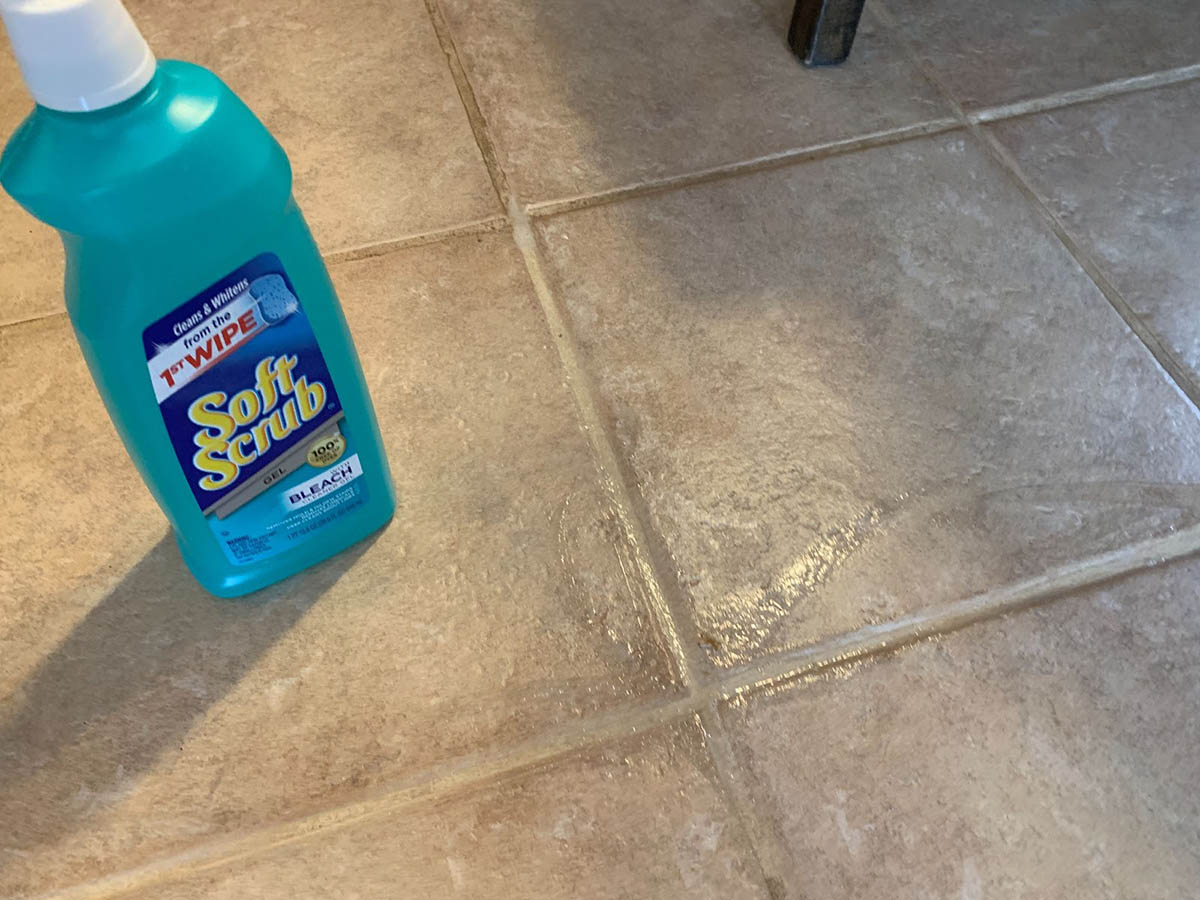
Get Soft Scrub grout cleaner at Amazon (3-pack).
Runner-Up
Black Diamond Ultimate Grout Cleaner
What We Like
- Convenient spray is easy to apply
- Works immediately
- Cleans and brightens without bleach
What We Don’t Like
- Strong smell
- Leaves residue if not rinsed properly
Specs
- Type Spray
- Compatibility Grout only
- Notable features Acid-free
Our Ratings: Ease of Use 4/5; Performance 4.5/5; Scent 3.5/5; Value 4/5
This Black Diamond grout cleaner may not have as solid a score as our top pick, but it still has much of what we’re looking for in a grout cleaner: It comes as a convenient spray, it works very quickly, and it requires minimal scrubbing. We also really like that it whitened almost as much as Soft Scrub without containing bleach—which is especially impressive since most products didn’t brighten nearly as well. When tested on both white and colored grout lines, the difference it made was almost hard to believe. It also did a great job removing dirt and soap scum from our shower tiles.
Still, as much as the aspects that impressed us about this pick really impressed us, there are a couple of things we don’t especially like. First, we found its smell fairly strong, so much so that we eagerly opened our windows during use. Also, since it’s acid-free, it didn’t clean calcium or water spots off our shower or tub. Finally, this product requires a bit more rinsing than others and will leave a residue if not properly washed away.
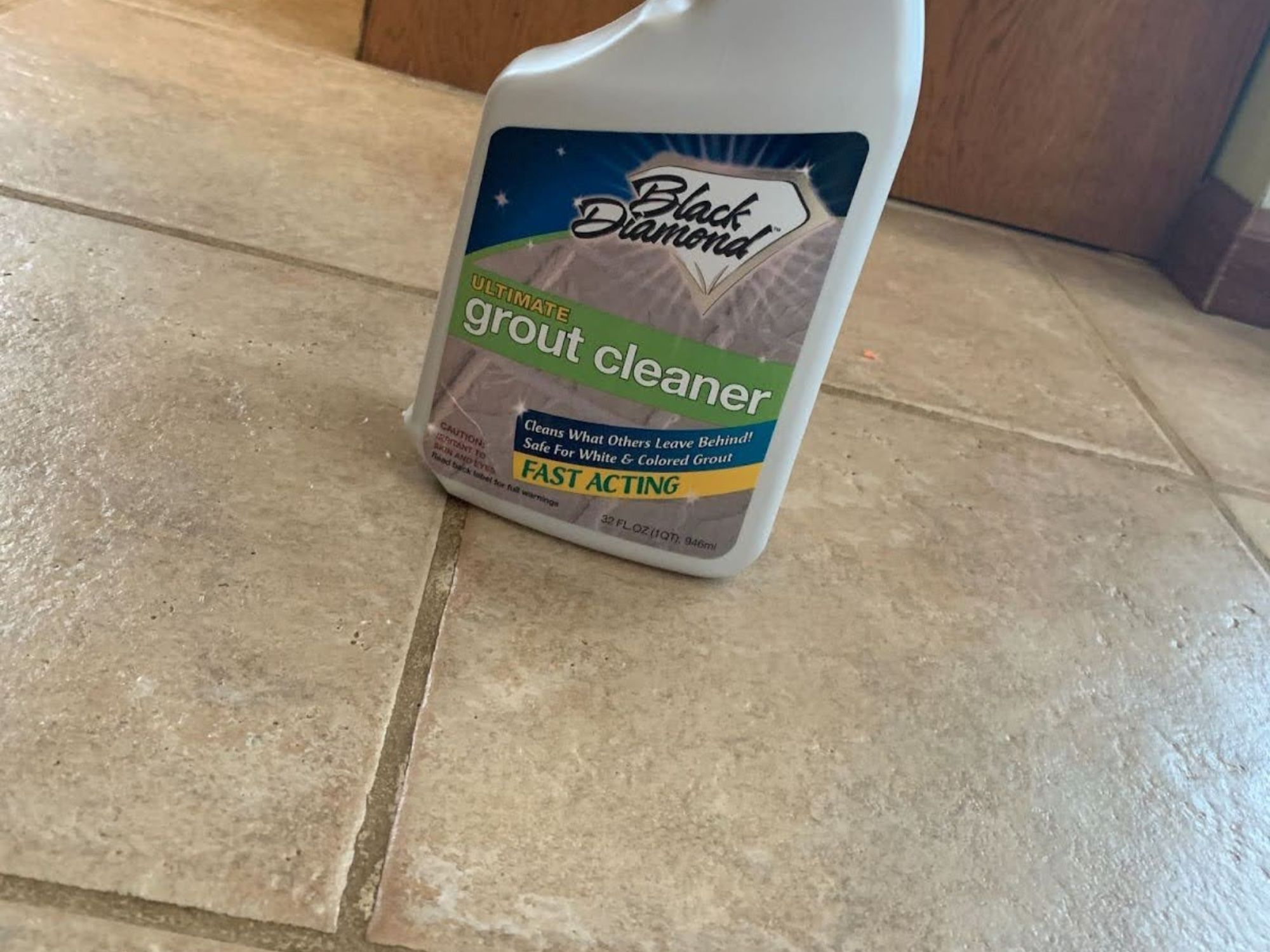

Get Black Diamond grout cleaner at Amazon.
Best Bang for the Buck
Star Drops The Pink Stuff Miracle Cleaning Paste
What We Like
- Great price and long list of possible uses
- Scent is light and pleasant
- Brightens and removes surface stains
What We Don’t Like
- Can scratch delicate surfaces if scrubbed too hard
- Requires a fair amount of rinsing
Specs
- Type Paste
- Compatibility Grout, tile, showers, glass, sinks, brass
- Notable features Vegan, cruelty-free, 99% natural
Our Ratings: Ease of Use 4/5; Performance 4/5; Scent 5/5; Value 4.7/5
It’s not too often teenagers ask their parents for specific cleaning products, but that’s exactly what happened with The Pink Stuff well before we put it through our grout-cleaning tests. This social-media-famous natural grout cleaner is touted as a “miracle” cleaner for everything from grout and tile to shoes and stoves. After our tests, we think its claims might be a little overblown, but this is definitely a value-priced, multipurpose product we can see ourselves keeping around the house.
The Pink Stuff paste is made with a pretty simple list of ingredients, including quartz, baking soda, and glycerin. The manufacturer says it has a fresh and fruity rhubarb scent, which we found light enough to be hardly noticeable at all. In terms of performance, this option didn’t whiten as effectively as either of our two top picks, but it did brighten our dingy mudroom grout a fair bit. It was tricky to keep the paste confined to the grout, but we didn’t mind since it made a definite difference when we decided to just clean the whole tile. Just be careful: its mild abrasive texture can scratch delicate materials like polished steel or ceramic. It may also be necessary to go over the clean area with warm water more than once to remove any residue.
Get The Pink Stuff grout cleaner at Amazon, The Home Depot, or Walmart.
Best Eco-Friendly
Rejuvenate Tile and Grout Cleaner
What We Like
- Safe for use around kids and pets
- Doesn’t need to be scrubbed or rinsed away
- Excellent for ongoing grout maintenance, cleaning tile floors
What We Don’t Like
- Does not whiten stained grout well
- Wide spray isn’t effective for precise application
Specs
- Type Spray
- Compatibility Grout, tile, bathroom walls, showers
- Notable features: Bio-enzymatic, no need to rinse
Our Ratings: Ease of Use 4.5/5; Performance 3.5/5; Scent 5/5; Value 4.5/5
One of the hardest parts of our testing process was keeping our dogs away from grout covered in chemicals that needed time to work, so we found the fact that the Rejuvenate bio-enzymatic tile and grout cleaner is safe for use around pets and kids incredibly convenient. This easy-to-use no-scrub formula simply required us to spray it across our tile floor, mop, and let dry. Instead of taking time to ensure we rinsed it thoroughly away, we went on to other tests and let the enzymes continue to clean.
While this Rejuvenate spray didn’t whiten our grout lines like some of the other products we recommend, it did a great job breaking down dirt and grime so that we could easily mop it away. But since water works for mopping as well, we also tested it on some dried-on pasta sauce. After spraying one spot with plain water and one with Rejuvenate, it was obvious how effective the enzymes are at breaking down stuck-on stains. We’ll definitely be using this product with our tile floor mop for ongoing cleaning and maintenance without any worry about our pets stepping across it before it’s dry.
What our tester says: “We kept using this spray after our grout tests were over, and it’s our new favorite for keeping all our floors clean. We also use it as a shower cleaner, and it does a great job of breaking down soap scum so that we can rinse our walls clean without scrubbing.” —Michelle Larson, Product Reviews tester and writer
Get the Rejuvenate grout cleaner at Amazon, Lowe’s, or The Home Depot.
Best Heavy-Duty
Skylarlife Mold & Mildew Stain Cleaner Remover Gel
What We Like
- Thick gel stays put even on vertical surfaces
- Also works with caulk and silicone sealants
- No scrubbing necessary
What We Don’t Like
- Must wait 5 to 6 hours after applying
- Easy to forget clear gel is there
- Eye and skin irritant
Specs
- Type Gel
- Compatibility Grout, tile, silicone sealant, caulk, sinks, bathtubs, showers, toilet bowls
- Notable features Concentrated formula
Our Ratings: Ease of Use 4.3/5; Performance 4.5/5; Scent 4/5; Value 4.5/5
Dealing with grout and caulk that’s seriously stained or covered in mold and mildew? This gel from Skylarlife can provide effective cleaning and whitening without any scrubbing. While we tested it for cleaning grout lines in our entryway, it also works well on caulk and sealant around sinks, tubs, and even windows. Though the heavy-duty formula is highly concentrated, it still needs to sit on surfaces for 5 to 6 hours to deliver its full effects. Once that time is up, slip on a pair of gloves and thoroughly wash it away.
While we appreciate this cleaner’s ease of application, a tester did make the mistake of forgetting they’d applied the clear gel to a section of grout only to accidentally stick a hand in it later. Since the product is both an eye and skin irritant, they washed their hands well and were fine, but it’s best to wear gloves and mark off the area so no pets, kids, or fully grown but forgetful adults get into it. User errors aside, this gel is excellent for brightening white grout, and it really shines when used to eliminate mold and mildew from caulk and silicone sealants.
Get the Skylarlife grout cleaner at Amazon.
Best Grout-Cleaning Tool
Rubbermaid Multi-Purpose Cordless Power Scrubber
What We Like
- Multiuse tool great for precision scrubbing
- Battery power makes it portable
- Pairs well with other grout-cleaning products
What We Don’t Like
- Without chemical cleaners’ assistance, only tackles surface dirt
- Needs 4 AA batteries
Specs
- Type Cordless tool
- Compatibility All surfaces
- Notable features Also available as a kit
Our Ratings: Ease of Use 5/5; Performance 4.5/5; Scent n/a; Value 4.8/5
Let us start by saying we really like this little grout cleaner tool. Sure, it’s more effective when paired with a bottled cleaning product, but with water alone it removed dirt and other surface spots on grout and tile quite well. Its size was somehow ideal for the thick grout lines in our mudroom as well as the thin ones along our kitchen backsplash. And given the amount of manual effort it saves, we think it’s well worth its price.
This tool made quick work of cleaning grout and tile in our testing area, but we weren’t ready to be done with it yet. Before the day was over, we also used it to scrub around the jets in our tub, clean between the handles on our bathroom sink, and knock limescale off our basement shower head. Since it’s battery-powered, weighs less than a pound, and is watertight for use in wet environments, there really isn’t anywhere we won’t try this tool. The Power Scrubber is also available with various interchangeable heads as part of a larger kit for use in other areas of the home, making it a compact workhorse.
Get the Rubbermaid grout cleaner at Amazon, Lowe’s, The Home Depot (18-piece kit), or Target (with extra head).
Best Drill Attachment
Useful Products Drill Brush Power Scrubber
What We Like
- Comes with 3 heads for different cleaning tasks
- Quick-change shaft works with drills and drivers
- Medium-stiffness nylon bristles clean without scratching
What We Don’t Like
- Heads feel too big for thin grout lines
- May work better with additional cleaning products
Specs
- Type Drill attachments
- Compatibility Grout, tile, porcelain, bathtubs, showers, toilets, linoleum
- Notable features Fits cordless drills and impact drivers
Our Ratings: Ease of Use 4/5; Performance 4.5/5; Scent n/a; Value 4.7/5
Like many of the products that made our list, this set of drill brush attachments doesn’t only work on grout and tile. The kit comes with three medium-bristle brush heads: a 2-inch detail brush, a 4-inch flat brush, and a bullet-shaped brush for curved spaces. It’s designed for use on grout, tile, porcelain, tubs, showers, and toilets. Each head has a quick-change shaft that easily attaches to a corded or cordless drill or driver.
Like the other grout-cleaning tool on our list, this pick may work best when used in combination with other products. However, since attaching it to a drill or driver adds such substantial power, we still found it quite effective using water alone. It did feel like even the smallest head was on the large side, however, so this pick may be best for cleaning grout and tile simultaneously. To avoid unfortunate scratching, it may be smart to test it in an inconspicuous spot first. We found the bristles held up well across multiple surfaces and didn’t cause any damage. In fact, we liked this kit so much that we’re already considering buying a heavier-duty set in preparation for outdoor spring cleaning.
What our tester says: “My initial thoughts about this product were that I’d never take the time to dig out the heads and my drill just to clean my grout. But once I started using it, I was so impressed with how much manual scrubbing it saved me that I found myself running around the house looking for other things I could clean.” —Michelle Larson, Product Reviews tester and writer
Get the Useful Products grout cleaner at Amazon or Drill Brush.
ALSO TESTED
Though each of the products we tested has relatively high user ratings, we don’t think they’re all cut out for cleaning grout.
- The Microban 24-Hour Multi-Purpose Cleaner removed a few tough stains, but it did not work as well as other cleaners. This product is probably better for sanitization and prevention than stain removal.
- We found the Zep Grout Cleaner & Brightener to be overwhelming in scent and limited in use. It didn’t clean grout particularly well and is not safe for marble, terrazzo, travertine, natural stone, or Corian.
Jump to Our Top Picks
How We Tested the Best Grout Cleaners
| Products tested | 14 |
| Time spent testing | 21 hours |
| Tests performed | 6 |
| Price range | $5 to $20 |
After combing through the many grout cleaners available on the market, we chose 14 highly-rated products for hands-on testing, including a variety of sprays, gels, pastes, and cordless tools. We then tested the cleaners on the (very filthy) grout in our kitchen and bathroom floors, mudroom, entryway, showers, tubs, and a smattering of other surfaces that struck our fancy.
During testing, we evaluated each product based on how easy it was to apply precisely, how long we had to wait for it to work, how much scrubbing we had to do, and how many times we had to rinse to remove its residue. We also considered its smell; how well it cleaned, brightened, and removed stains; and whether it had more than one useful application. After scoring each product using these parameters, we assigned the worthy contenders relevant awards and got rid of the rest.
| Product Name | Ease of Use | Performance | Scent | Value |
| Soft Scrub With Bleach Cleaner Gel | 5 | 5 | 5 | 5 |
| Black Diamond Ultimate Grout Cleaner | 4 | 4.5 | 3.5 | 4 |
| Star Drops The Pink Stuff Miracle Cleaning Paste | 4 | 4 | 5 | 4.7 |
| Rejuvenate Tile and Grout Cleaner | 4.5 | 3.5 | 5 | 4.5 |
| Skylarlife Mold & Mildew Stain Cleaner Remover Gel | 4.3 | 4.5 | 4 | 4.5 |
| Rubbermaid Multi-Purpose Cordless Power Scrubber | 5 | 4.5 | n/a | 4.8 |
| Useful Products Drill Brush Power Scrubber | 4 | 4.5 | n/a | 4.7 |
When to Consider When Choosing a Grout Cleaner
Grout cleaners should be gentle enough to polish tile without scratching but strong enough to eliminate discoloration due to mold, mildew, and dirt. Whether you plan on cleaning a floor, kitchen backsplash, or shower stall, choosing the right product depends on a variety of factors.
Active Ingredients
The best grout cleaners should lift dirt, kill mold, clean soap scum, and brighten tile with ease. But if you have pets or kids and are sensitive to chemicals, you’ll want to consider ingredient safety as well.
Mold and Mildew Removal
Depending on the severity of the mold situation, a grout cleaner with one of the following ingredients may be necessary: an acid, hydrogen peroxide, oxygen bleach, or chlorine bleach.
- A mild acid-based cleaner (containing citric or oxalic acid, for example) is the least harsh of these formulas and typically won’t damage chrome, stainless steel, or tile.
- An oxygen bleach (containing hydrogen peroxide) is moderately strong, while chlorine bleach is the strongest and most caustic.
- Chlorine bleach formulas should only be used when the goal is to whiten, as they can also lift color from dyed grout.
All of these ingredients will also kill germs and bacteria, which, when applied in low doses, can be helpful, especially in bathroom and kitchen areas.
Whitening and Brightening
While chlorine bleach is often a go-to ingredient in whitening products, it is not necessarily the best or only option. Bleach can release harmful airborne particles when mixed with other cleaning substances and is associated with health concerns (respiratory damage, for example). That said, it can be an effective part of a cleaning regimen if used in small doses.
Beyond bleach, both citric and oxalic acid can lift soap scum and surface staining. Abrasive products can be great for getting out dirt and restoring grout and tile to an almost-new appearance. Products with minerals like feldspar can work wonders on hard surfaces, including grout and tile.
Grout Color
Grout is porous, so it will absorb any cleaner used on it, and using the wrong cleaner could damage the grout lines. For this reason, it’s important to make sure the cleaner is compatible with the grout color, as not all grout cleaners are intended to clean colored grout. For example, those that contain bleach are typically appropriate for use on white grout lines only.
While bleach and other harsh cleaners can be effective for cleaning white grout lines, they can also break down the grout over time and eventually cause damage that will allow mold to grow. Additionally, breaking down the grout can lead to even more discoloration.
Tile Material
Not all grout cleaners can be used on all types of tiles. The more porous the tile material, the more likely the wrong grout cleaner is to cause damage or discoloration. For example, sandstone is very porous and likely to be damaged by harsh cleaners.
To ensure that a cleaner is safe for the tile in the home, check the label for a list of the materials it can and cannot be used on. Still unsure? Test the tile by putting a drop of water on it. If the water absorbs and leaves a “wet” mark, it’s likely very porous. If the water sits on the tile and doesn’t absorb, it is nonporous. Use additional caution when working with porous tile.
Cleaning Time
One consideration when cleaning tile grout is that some types of grout cleaners can cause damage to the grout if they’re misused (for instance, by letting them sit on the grout for more time than recommended.)
Some of the best grout cleaners need to be allowed to sit for several minutes before scrubbing or wiping off to be effective, but going over the manufacturer’s recommended time could lead to damage. Be especially careful with abrasive cleaners that contain bleach or other acid-based cleaners, as these are most likely to lead to damage if left on too long.
Application Method
Most grout-cleaning products are sprays, gels, or pastes. Many spray and gel products claim to work without scrubbing, which can save time and energy. On the downside, these cleaners may contain harsher acids, solvents, or chlorine bleach. Pastes that require users to scrub them in as part of the application process do require a bit more work, but they can be especially effective on floors and heavily soiled grout.
In terms of tools, some people choose to use old toothbrushes to clean grout lines, but a small battery-powered brush will be much more efficient and effective. Larger brushes and pads work well on wider grout lines, tile floors, and backsplashes. To prevent scratching nearby surfaces, use gentle pressure and avoid overly vigorous scrubbing. Harsh scrubbing action combined with abrasive cleaners can cause holes and break down the grout, leading to damage that can eventually require grout repair.
Health and Surface Safety
Commercial grout cleaners can contain a variety of harsh chemicals, including bleach and ammonia. While these active ingredients can be efficient for lifting surface stains, soap scum, and mold, they can also affect health and harm the environment. For example, chlorine bleach and ammonia can be caustic and poisonous if improperly used, causing skin and eye irritation as well as respiratory damage. At the same time, their whitening powers are almost unbeatable, especially for tough stains, mold, and mildew.
To minimize potential health and safety issues, choose one of the natural or eco-friendly grout cleaners from our list. They are effective for cleaning without using harsh chemicals. Consider looking for products with the Environmental Protection Agency (EPA)’s Safer Choice seal or research the ingredients using the Environmental Working Group’s Guide to Healthy Cleaning.
When using a heavy-duty cleaner or one that contains bleach, it’s smart to wear protective gear like rubber gloves, a face mask, and goggles and use them in well-ventilated spaces. Use extra care if pets or children could be exposed to that area, and be sure to protect surrounding spaces from getting unintentionally sprayed or splashed.
How to Protect Tile Grout
There are two general types of grout: sanded and unsanded grout. Sanded grout is more commonly used on horizontal surfaces like tile floors, whereas unsanded grout often pairs with vertical tiles in showers or on backsplashes. Since it’s more porous (and likely subject to foot traffic), sanded grout is more likely to become stained through improper care, accidental spills, and dirt. Still, unsanded grout must contend with substances like dust, dirty water, soap scum, and moisture that can encourage mold and mildew growth over time.
Both grout types are subject to staining, especially if they aren’t properly sealed. To help protect the grout and prevent future stains, buildup, and mold and mildew growth, consider using a grout sealer after cleaning. It’s smart to seal grout at least once a year, and more frequently if it’s a high-traffic area or often-scrubbed.
FAQs
Even the best grout cleaners may not be products you use especially often, so you may still have some questions about how to use them. Below are answers to some popular questions about grout cleaners.
Using bleach frequently to clean grout can eventually damage its structure, so rather than using bleach cleaners for regular cleaning, it’s best to use them periodically to return dingy grout to its original brightness.
Choose a cleaner tailored to the type of debris that you’re removing. Mold and mildew, for instance, may require a different cleaning agent than simple dirt does. If you need to remove grout haze, you may need a different approach altogether.
At minimum, it’s a good idea to clean grout and tile at least every 6 months. In high-traffic areas or places prone to mold and mildew, you may need to clean your grout more frequently or use additional maintenance products like tile cleaners or shower tile cleaners.
We think a power scrubber is the best tool-type cleaner for grout in a shower. Battery-powered mini scrubbers are great for more detailed grout cleaning, and larger drill attachments work well on grout and tile together. If you have a grout steam cleaner, it may also work well on shower grout.
The products we recommend in this guide cost between $5 and $20, so you should be able to get one of the best grout cleaners without spending a lot of money.
Yes, choosing a grout cleaner that’s not compatible with tiles can cause damage. It’s a good idea to read the label on the cleaner you’re considering to ensure it works with your tile material, and you can also review online guides like ours on how to clean ceramic tile for additional tips and techniques.
Meet the Tester
Michelle Larson has been writing and editing online content for over 10 years, specializing in everything from home improvement, cleaning, and beginner-level DIY projects to health and software. As much as she dreads dealing with detailed tasks like cleaning grout, well-maintained spaces are one of the things that bring her a true sense of calm and accomplishment.
Additional research provided by Chaunie Brusie and Andréana Lefton.

